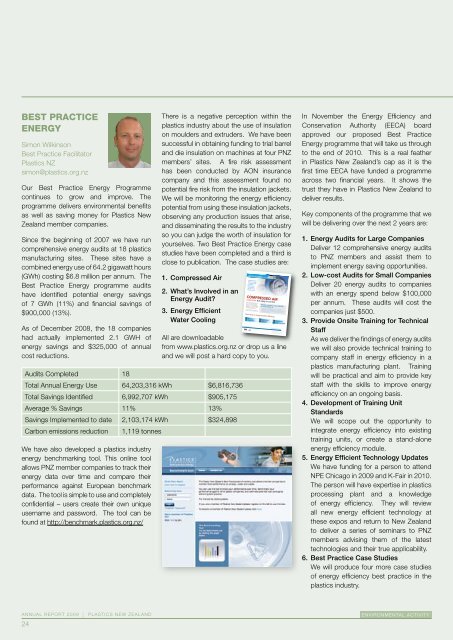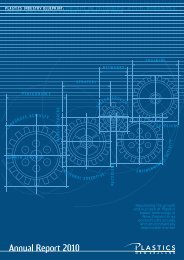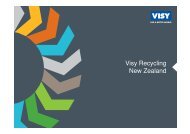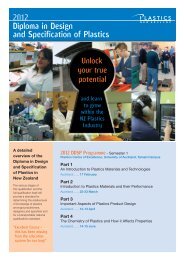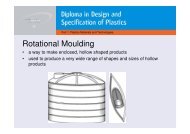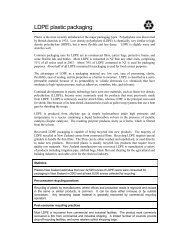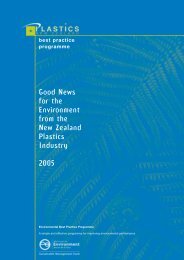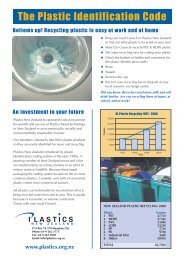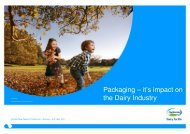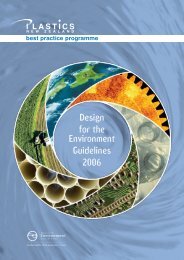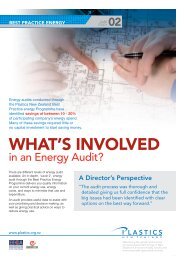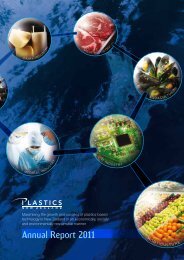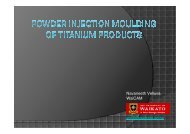Annual Report 2009 - Plastics New Zealand
Annual Report 2009 - Plastics New Zealand
Annual Report 2009 - Plastics New Zealand
Create successful ePaper yourself
Turn your PDF publications into a flip-book with our unique Google optimized e-Paper software.
Best practice<br />
energy<br />
Simon Wilkinson<br />
Best Practice Facilitator<br />
<strong>Plastics</strong> NZ<br />
simon@plastics.org.nz<br />
Our Best Practice Energy Programme<br />
continues to grow and improve. The<br />
programme delivers environmental benefits<br />
as well as saving money for <strong>Plastics</strong> <strong>New</strong><br />
<strong>Zealand</strong> member companies.<br />
Since the beginning of 2007 we have run<br />
comprehensive energy audits at 18 plastics<br />
manufacturing sites. These sites have a<br />
combined energy use of 64.2 gigawatt hours<br />
(GWh) costing $6.8 million per annum. The<br />
Best Practice Energy programme audits<br />
have identified potential energy savings<br />
of 7 GWh (11%) and financial savings of<br />
$900,000 (13%).<br />
As of December 2008, the 18 companies<br />
had actually implemented 2.1 GWH of<br />
energy savings and $325,000 of annual<br />
cost reductions.<br />
Audits Completed 18<br />
Total <strong>Annual</strong> Energy Use 64,203,316 kWh $6,816,736<br />
Total Savings Identified 6,992,707 kWh $905,175<br />
Average % Savings 11% 13%<br />
Savings Implemented to date 2,103,174 kWh $324,898<br />
Carbon emissions reduction<br />
1,119 tonnes<br />
We have also developed a plastics industry<br />
energy benchmarking tool. This online tool<br />
allows PNZ member companies to track their<br />
energy data over time and compare their<br />
performance against European benchmark<br />
data. The tool is simple to use and completely<br />
confidential – users create their own unique<br />
username and password. The tool can be<br />
found at http://benchmark.plastics.org.nz/<br />
There is a negative perception within the<br />
plastics industry about the use of insulation<br />
on moulders and extruders. We have been<br />
successful in obtaining funding to trial barrel<br />
and die insulation on machines at four PNZ<br />
members’ sites. A fire risk assessment<br />
has been conducted by AON insurance<br />
company and this assessment found no<br />
potential fire risk from the insulation jackets.<br />
We will be monitoring the energy efficiency<br />
potential from using these insulation jackets,<br />
observing any production issues that arise,<br />
and disseminating the results to the industry<br />
so you can judge the worth of insulation for<br />
yourselves. Two Best Practice Energy case<br />
studies have been completed and a third is<br />
close to publication. The case studies are:<br />
1. Compressed Air<br />
2. What’s Involved in an<br />
Energy Audit<br />
3. Energy Efficient<br />
Water Cooling<br />
Compressed air<br />
uses up to 40%<br />
of the electricity<br />
in a plastic<br />
factory, yet it<br />
only delivers<br />
10-15% of the<br />
energy it uses.<br />
COMPRESSED AIR<br />
expensive but easy to control<br />
Energy audits of the <strong>New</strong> <strong>Zealand</strong> plastics<br />
industry in 2 07 and 2 08 have found<br />
that injection moulding companies use<br />
betw en 5-5% of their total electricity on<br />
compre sed air. Pipe/profile extruders and<br />
thermoforming companies use 20-40% of<br />
their electricity on compre sed air.<br />
This guide contains three simple steps to<br />
reducing compre sed air costs on your site.<br />
www.plastics.org.nz<br />
<strong>Plastics</strong> company saves $40,000<br />
in compressed air<br />
A <strong>New</strong> <strong>Zealand</strong> plastics manufacturer has found that compre sed air<br />
represents 38% of their a nual energy bi l - a cost of $120,0 0 p.a.<br />
The company is able to save $40, 0 of these a nual costs by fixing air leaks,<br />
reducing the pre sure set point, and by using electric blowers rather than<br />
compre sed air in some areas.<br />
Three Steps to Compressed Air Efficiency:<br />
Reduce<br />
Optimise Continual<br />
1 Demand<br />
2 Supply<br />
3 Improvement<br />
Maximising the growth and su ce s<br />
of plastics-based technology in <strong>New</strong><br />
<strong>Zealand</strong> in an economica ly, socia ly and<br />
environmenta ly responsible ma ner.<br />
All are downloadable<br />
from www.plastics.org.nz or drop us a line<br />
and we will post a hard copy to you.<br />
In November the Energy Efficiency and<br />
Conservation Authority (EECA) board<br />
approved our proposed Best Practice<br />
Energy programme that will take us through<br />
to the end of 2010. This is a real feather<br />
in <strong>Plastics</strong> <strong>New</strong> <strong>Zealand</strong>’s cap as it is the<br />
first time EECA have funded a programme<br />
across two financial years. It shows the<br />
trust they have in <strong>Plastics</strong> <strong>New</strong> <strong>Zealand</strong> to<br />
deliver results.<br />
Key components of the programme that we<br />
will be delivering over the next 2 years are:<br />
1. Energy Audits for Large Companies<br />
Deliver 12 comprehensive energy audits<br />
to PNZ members and assist them to<br />
implement energy saving opportunities.<br />
2. Low-cost Audits for Small Companies<br />
Deliver 20 energy audits to companies<br />
with an energy spend below $100,000<br />
per annum. These audits will cost the<br />
companies just $500.<br />
3. Provide Onsite Training for Technical<br />
Staff<br />
As we deliver the findings of energy audits<br />
we will also provide technical training to<br />
company staff in energy efficiency in a<br />
plastics manufacturing plant. Training<br />
will be practical and aim to provide key<br />
staff with the skills to improve energy<br />
efficiency on an ongoing basis.<br />
4. Development of Training Unit<br />
Standards<br />
We will scope out the opportunity to<br />
integrate energy efficiency into existing<br />
training units, or create a stand-alone<br />
energy efficiency module.<br />
5. Energy Efficient Technology Updates<br />
We have funding for a person to attend<br />
NPE Chicago in <strong>2009</strong> and K-Fair in 2010.<br />
The person will have expertise in plastics<br />
processing plant and a knowledge<br />
of energy efficiency. They will review<br />
all new energy efficient technology at<br />
these expos and return to <strong>New</strong> <strong>Zealand</strong><br />
to deliver a series of seminars to PNZ<br />
members advising them of the latest<br />
technologies and their true applicability.<br />
6. Best Practice Case Studies<br />
We will produce four more case studies<br />
of energy efficiency best practice in the<br />
plastics industry.<br />
ANNUAL REPORT <strong>2009</strong><br />
I<br />
24<br />
PLASTICS NEW ZEALAND<br />
ENVIRONMENTAL ACTIVITY


